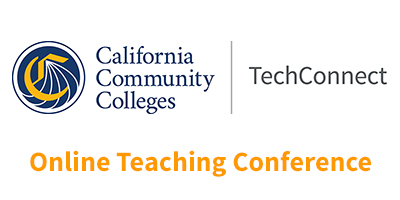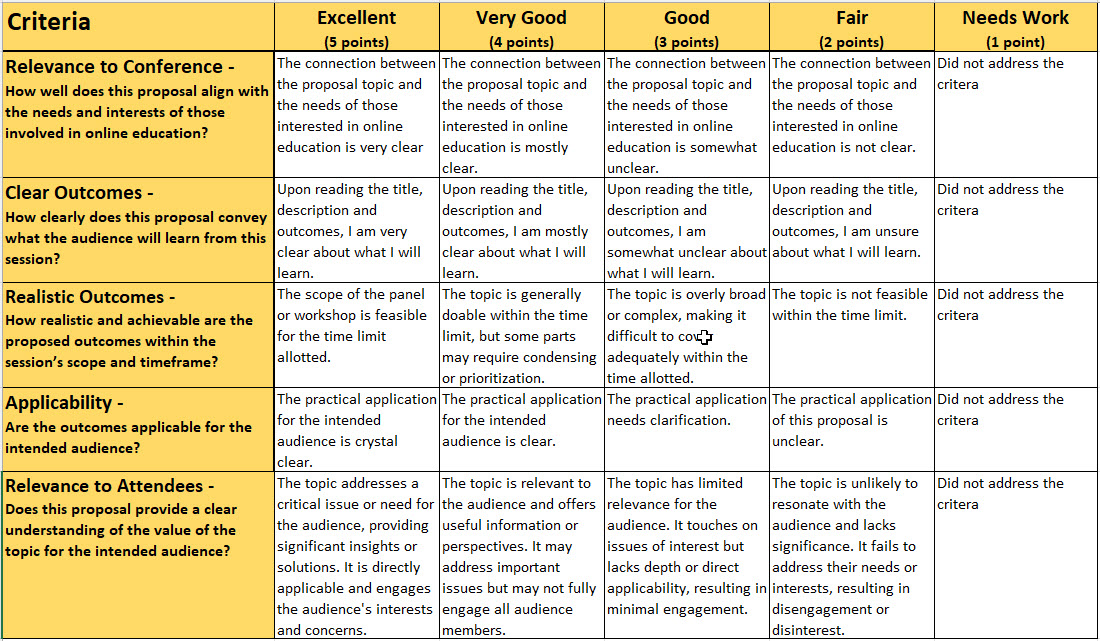The OTC’26 Call for Proposals
- Submissions will be accepted from September 30, 2025 until midnight on January 31, 2026
We would like to invite you to submit a concurrent session proposal for the CCC TechConnect 2026 Online Teaching Conference! Please read the information on this page and then Submit a Proposal.
The Online Teaching Conference takes pride in offering the best content for the online teaching community presented BY online teaching professionals and experts. As such, we depend on the online teaching community to participate in the creation of our conference schedule. Engaging a broad group of online educators ensures a more diverse mix of perspectives and experiences. This process enables us to better respond to attendee needs.
Timeline and Proposal Criteria
- Submissions will be accepted starting September 30, 2025 with a deadline of midnight on January 31, 2026, but early submissions are encouraged!
- Each proposal may have up to 4 presenters
- We welcome non-commercial presentations from educators in the California Community Colleges and beyond. Note: If you are a vendor, please contact Stacey Boswell.
- Proposal must be submitted electronically.
- Submitting a proposal is confirmation of availability to present at any time June 23-25 if selected UNLESS specific exceptions are noted on the proposal form.
- All presenters will be required to register for the conference at the early bird rate of $549, (if your proposal is accepted, you will receive a link to register as a “presenter” in March 2026 or earlier).
- Presenters will be asked to upload ADA compliant resources (presentations, documents or links) 1-2 weeks prior to their presentation. Presentation guidelines and a ppt template will be provided.
Theme
Designing the Future of Online Learning: Human Element, Ethics, Innovation, and AI
The 2026 Online Teaching Conference goes beyond the AI hype to focus on what truly matters: the human connection at the heart of learning. This year, we dive into the powerful potential of human-AI collaboration. We’ll move past simply using new tools to fundamentally rethink how we foster creativity, cultivate engagement, and build inclusive communities in digital spaces. OTC ’26 is a call to action for educators to lead the way—to design learning experiences where AI handles the repetitive, empowering us to focus on the relational. Together, we’ll build ethical frameworks that protect academic integrity and equity, ensuring that the soul of teaching not only endures but thrives in this new era. Join us to shape a future where AI enriches, not replaces, the transformative power of education.
Tracks*
To allow participants to plan their schedules more effectively, enabling a focused approach to learning and development, the following tracks will be offered at OTC’26. When submitting your proposal, you will be required to indicate the track that you feel best matches your topic, (please note that upon review, the content committee may reassign the track).
1) AI in Higher Education
This track will explore the complex landscape of AI adoption within higher education. It will focus on the various types of AI tools being implemented – including those integrated into existing platforms like Canvas, those licensed separately, and those provided through state initiatives. The sessions will also address the critical criteria and decision-making processes institutions use when evaluating and implementing new AI technologies to ensure they align with campus goals and positively impact student success.
Examples:
– APIs, agentic systems, interoperable platforms
2) Innovative Pedagogy and Course Design
This track explores forward-thinking approaches to teaching, curriculum design, and course delivery that empower faculty to engage students in meaningful, inclusive, and future-ready ways. Sessions will highlight both conceptual frameworks and hands-on strategies for reimagining teaching in the digital age, with an emphasis on equity, accessibility, and scalability.
Examples:
– Reimagining teaching and curriculum design through prompt/context engineering, human–AI collaboration, and adaptive learning models.
– Practical strategies for integrating AI tools into teaching while maintaining academic integrity and fostering critical digital literacy.
– Best practices for designing hybrid and online courses that maximize flexibility, engagement, and learning outcomes.
– Leveraging immersive technologies such as VR, AR, and simulations to provide experiential learning opportunities beyond the traditional classroom.
– Open pedagogy and co-creation practices that position students as partners in knowledge-building and contributors to open educational resources (OER).
3) Designing Engaging Online and Digital Learning
Create human-centered, inclusive, and interactive digital learning experiences that strengthen student connection and engagement in online and hybrid environments. This track emphasizes accessibility, cultural responsiveness, and strategies for meeting students where they are – whether Gen Z or adult learners – while leveraging technology as a tool to deepen, not replace, human presence in teaching.
Examples:
– Designing assignments that foster digital literacy, inclusivity, and critical thinking.
– Strengthening instructor presence and building authentic connections in online spaces.
– Using multimedia, storytelling, and culturally responsive design to enhance comprehension and belonging.
– Leveraging collaborative tools and peer-to-peer platforms to build community and active participation.
– Exploring adaptive technologies, AI, and analytics as one of many tools to personalize learning pathways and provide timely, equitable feedback.
4) Equity, Inclusion, and Accessibility
Center the human side of digital learning by exploring strategies that advance equity, strengthen accessibility, and foster inclusive environments where students feel valued and supported. This track highlights practices that promote transparency, uphold integrity, and prioritize student motivation and well-being.
Examples:
– Ensuring academic integrity in digital environments through innovative assessment design, proctoring solutions, and trust-based approaches.
– Strategies for building inclusive learning spaces that support belonging, representation, and cultural responsiveness
– Applying Universal Design for Learning (UDL) principles to ensure accessibility and inclusivity for diverse student populations.
5) Assessment and Feedback
Rethink assessment and feedback in ways that measure meaningful learning, uphold integrity, and promote equity. This track highlights authentic and inclusive approaches that move beyond traditional exams while using data and technology thoughtfully to support student growth.
Examples:
– Designing authentic, project-based, and portfolio assessments that measure real-world skills and application of knowledge.
– Leveraging AI-driven tools for formative feedback to provide students with timely, personalized insights into their progress.
– Exploring alternative assessment strategies that emphasize creativity, collaboration, and critical thinking beyond traditional exams.
– Using learning analytics and dashboards to track student performance, identify trends, and support data-informed instructional decisions.
– Authentic and alternative assessments that prioritize student creativity, problem-solving, and real-world application in an AI-driven landscape.
6) Ethics and Governance
Examining the policies, frameworks, and safeguards needed in higher education to balance innovation with accountability, academic values, and public trust.
Examples:
– Managing academic integrity.
– Ensuring data privacy and security in the use of AI tools and learning analytics across higher education institutions.
– Addressing algorithmic bias and equity concerns to promote fairness and inclusivity in decision-making.
– Developing ethical guidelines for AI use in teaching, research, and administration that align with institutional values and accreditation standards.
– Building transparent communication strategies to foster public trust and faculty–student confidence in AI adoption.
Session Types*
- Panel – provides a coordinated presentation by up to 4 panelists on the general topic of the panel. We encourage working together across your community and with your colleagues to create a panel! (50 minutes including questions)
- Are you new to the system or a first timer at OTC? This is a great opportunity to collaborate and get your presenting game on!
- Discussion (Birds of a Feather) – designed to build networks and explore ideas. Rather than give a formal presentation, presenter will prepare questions or ideas around a particular topic and lead attendees in a discussion for the full length of the session. (50 minutes including questions)
- Lightning Talk – an individual 15 minute talk that will be grouped together with other 15 minute talks on the same subject to create a singular session (3 individuals + 5 minutes discussion for a total of 50 minutes)
- Are you new to the system or a first timer at OTC? This is a great opportunity to collaborate and get your presenting game on!
- Presentation/Demonstration – The traditional session type. The speaker presents a specific topic to the attendees. (50 minutes including questions)
- Roundtable – a 30-minute presentation followed by 20 minutes of discussion and feedback. Roundtable presenters should bring targeted questions to pose to others in order to learn from and with those attending. Roundtables are an ideal format for an in-depth discussion on a particular topic. (50 minutes including questions)
Target Audience*
- Beginner
- Intermediate
- Advanced
Learning*
- Learn about – (exposure) session will TALK ABOUT a topic, i.e. research, best practices, etc.
- Learn how – (application) session will ILLUSTRATE HOW to use a topic, i.e. utilize a tool, implement software, etc. Includes hands-on learning.
Supplemental (optional)
- Do you have a 1 minute video example of yourself presenting?
- A 5 bullet outline of your proposal?
- Are there any ‘pre-reqs’ attendees should know about to get the most out of your session? Include a list here (maximum of 5 items)
Session Length (optional)
Each session is 50 minutes, but we may accommodate a few longer sessions upon request. If you’d like to request a session that encompasses two session blocks with a break in between, please indicate this in your submission (though additional time is not guaranteed).
‘* required info
Scoring Rubric
Submit a Proposal
Do you have questions?
Contact speakers@onlineteachingconference.org. Please allow up to three business days for a response.
Diversity Statement
To support the California Community College (CCC) system’s commitment to equity, CCC TechConnect’s Online Teaching Conference welcomes proposals from enthusiastic and committed individuals from a broad range of backgrounds and experiences (representative of the learning community). We encourage people from all races/ethnicities, genders, sexual orientations, abilities, and cultures to submit proposals for consideration. Diversity makes us stronger.
Online Teaching Conference is a unique face-to-face premier gathering of faculty, staff, and administrators leading the way in developing innovative and effective online education. As an inter-segmental conference focused on curriculum, pedagogy and technology to improve online instruction, learning, and student success, the Online Teaching Conference is an opportunity for educators to network with colleagues, connect, share knowledge, impart and receive best practices, and develop professionally.
The Online Teaching Conference is an annual non-profit event presented by CCC TechConnect and funded under a California Community Colleges Chancellor’s Office grant. The conference connects online educators within as well as outside the CCC system and promotes high quality online teaching and course design.


